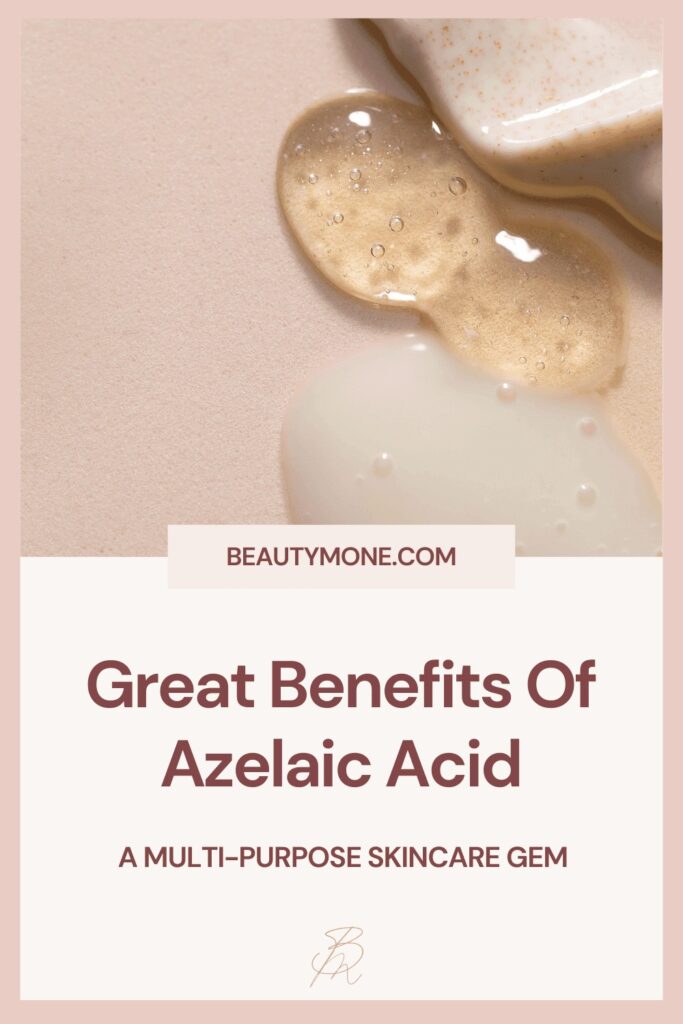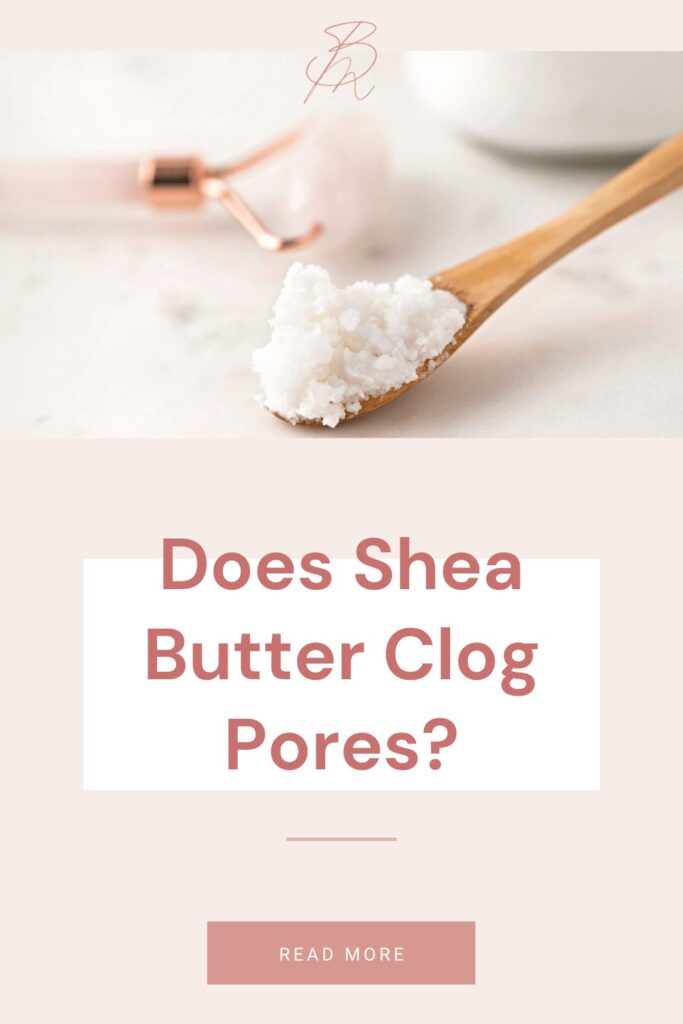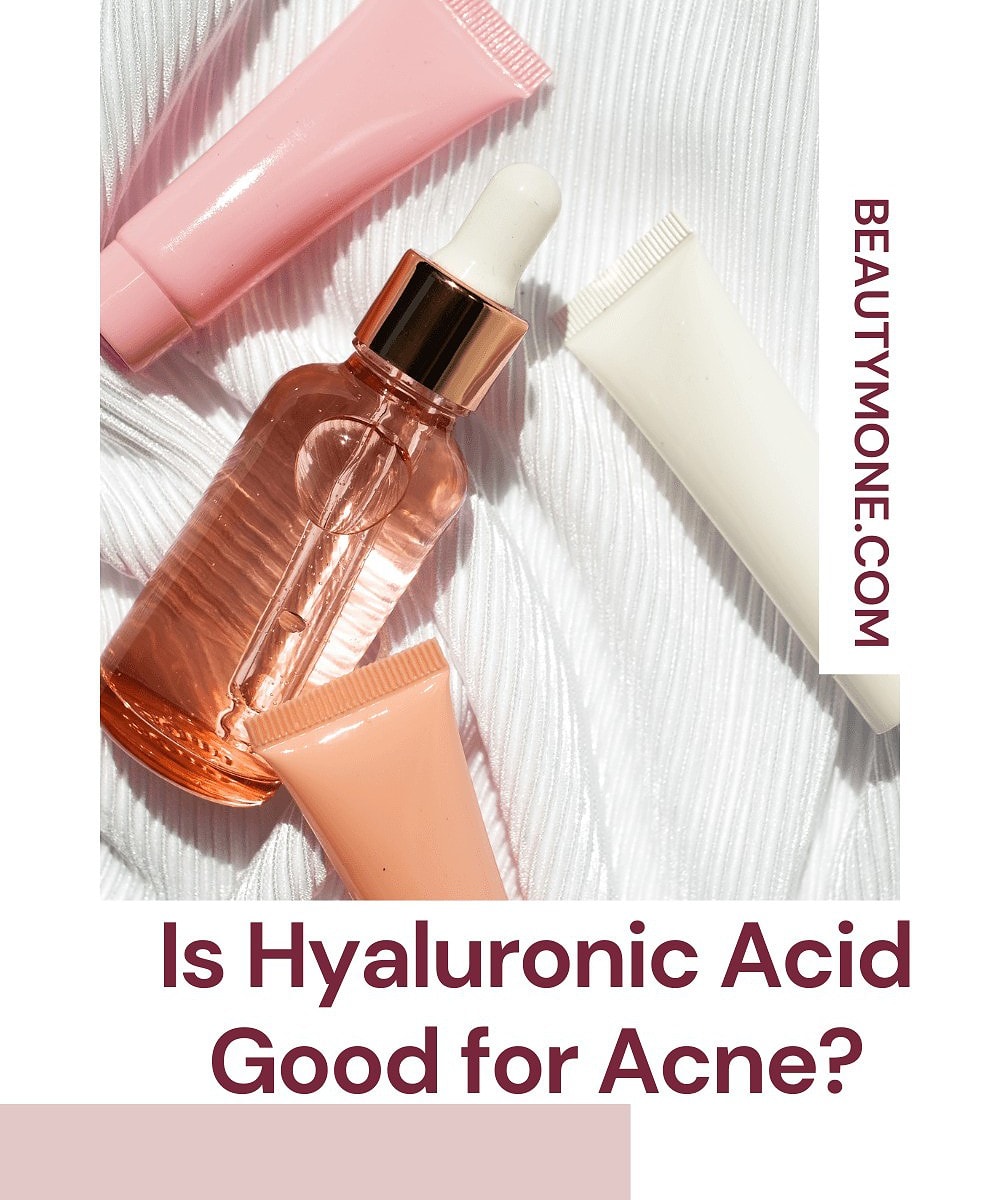
Hyaluronic acid is one of the most well-known skincare ingredients on the market today.
Praised for its ability to hydrate, hyaluronic acid has become a certified star in the skincare world. However, some questions remain. For example: Will hyaluronic acid break you out? Or is hyaluronic acid good for acne?
I’m here to answer all your queries about this popular ingredient, so keep reading to find out!
What is Hyaluronic Acid?
Hyaluronic acid is a humectant, which means it can retain moisture. Hyaluronic acid molecules can attract and bind over one thousand times their weight in water, making it a great choice for drier skin types.
It’s also a naturally occurring polysaccharide that is abundant throughout the human body, where it helps to cushion your joints and keep your skin plump and supple.
As you grow older, your body produces less hyaluronic acid– and as a result, your skin will often become dryer and more wrinkled over time.
This is where topical hyaluronic acid comes in, as a highly effective active ingredient that can hydrate your skin and keep it plump.
Does Hyaluronic Acid Help Acne?
The short answer is yes– but not directly.
Although acne-prone skin may deter you from hydrating products out of fear of more breakouts, they should actually be a key part of your routine! Acne-prone or not, your skin needs moisture.
Often, your skin will overproduce oil to compensate for the lack of hydration, which can lead to breakouts and pimples. By keeping your skin hydrated, you can avoid this overproduction of sebum.
One study in 2017 found that hyaluronic acid can help lock in moisture and control excess sebum production, which are two processes that can contribute to a reduction in acne.
Hydration is essential for those on acne medication, as many acne treatments work by drying up the skin to remove excess sebum and prevent clogged pores. While incredibly effective, these treatments will dry your skin– leading to irritation and excess oil production.
It can also create a skin-barrier dysfunction, leaving your skin more vulnerable to outside threats like environmental changes and sun damage.
All of this to say: Hydrating your skin is super important! Even though hyaluronic acid will not directly treat your acne, it will reduce other trigger factors.
Using hyaluronic acid in your skincare regime will contribute towards a balanced skincare routine which can improve your acne over time.
Something else to consider is hyaluronic acid’s ability to smooth skin texture, which often goes hand-in-hand with acne. It can help to reduce redness in your skin and, most importantly, assist it in recovering from breakouts!
If you have any freshly healing breakouts, hyaluronic acid would be a perfect addition to speed up the healing process.
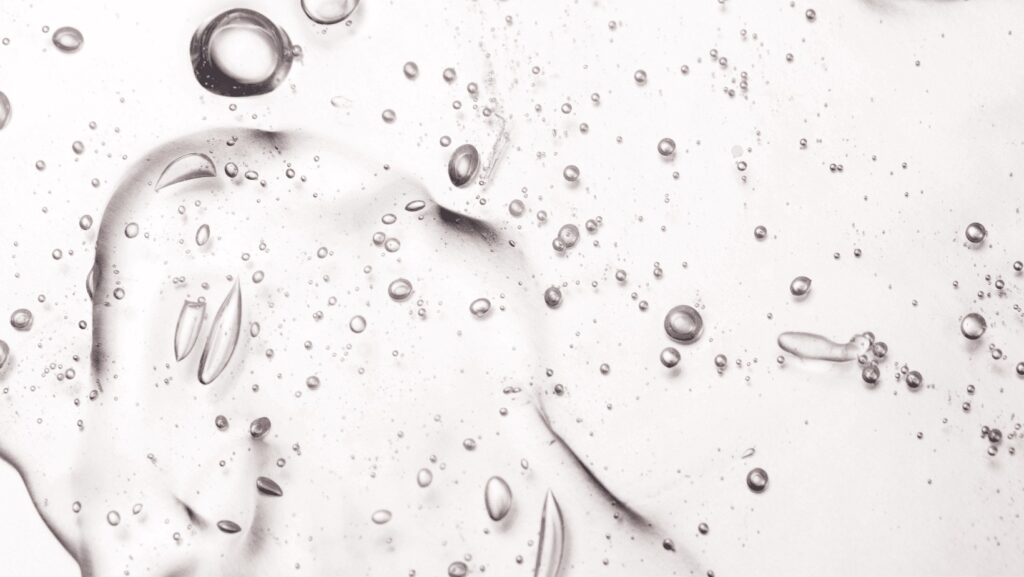
Other Skin Benefits of Hyaluronic Acid
Hyaluronic acid will do more than just hydrate your skin. This powerhouse ingredient didn’t become internet famous for nothing! Here’s a list of everything hyaluronic acid can do for your skin:
- Soothe irritation
- Prevent wrinkles and signs of aging
- Repair the skin barrier
- Improve skin texture
However, it’s important to remember that hyaluronic acid may not be the most hydrating ingredient on the market.
According to an article by Dr. Kristina Liu, larger hyaluronic acid molecules (the ones that are best at retaining water and keeping your skin hydrated) are too big to penetrate the skin.
This means that when you apply any topical form of hyaluronic acid, the larger molecules will only hydrate the surface of your skin.
There are smaller molecules in hyaluronic acid as well, but they retain less water and can only penetrate through the topmost layer of skin. Dr. Liu suggests looking for a hyaluronic acid serum with different molecules in various sizes for the best results.
Something else to consider is your climate, as hyaluronic acid draws moisture from its surroundings.
If you live somewhere with no moisture in the air, hyaluronic acid will start to pull moisture out of the deep layers of your skin, leaving it to feel drier than before!
So, if you are considering bringing hyaluronic acid into your skincare routine, it’s vital to consider your environment first!
Is Hyaluronic Acid Good For Acne Scars?
The answer isn’t black and white. There are a few newer studies out there that do point to hyaluronic acid potentially helping reduce the appearance of marks and discoloration left behind by acne.
However, there isn’t an overwhelming amount of research to back this up, and the aforementioned study was conducted with hyaluronic acid and laser treatments.
So, even though the participants who used topical hyaluronic acid saw a reduction in their acne scarring, this result was achieved in conjunction with CO2 fractional laser procedures.
Although hyaluronic acid won’t treat your acne scars directly, it will contribute to the overall health of your skin.
As a hydrating ingredient, hyaluronic acid can also be healing, which does make it a great complementary treatment for acne in helping to keep your skin barrier healthy.
Can Hyaluronic Acid Cause Acne?
It depends. Skincare isn’t one-size-fits-all! Products and ingredients that break one person out will be another’s holy grail.
Some people find that introducing a new product (such as hyaluronic acid) into their routine causes them to break out more, and they will simply discontinue use to prevent further breakouts. Other people will start using the same product and not have any issues at all!
The best advice is to patch test. Try hyaluronic products on a small part of your face to see if you experience any adverse effects.
Following that, slowly introduce the skincare ingredient into your routine and see how your skin reacts. Get to know your skin so that you understand what types of skincare products you are (and aren’t) suitable for!
Can Hyaluronic Acid Cause Purging?
Purging is your skin’s reaction to an active ingredient that increases the cell turnover rate of your skin cells. It often occurs when introducing products into your routine that are chemical exfoliants, such as salicylic or glycolic acid. Since hyaluronic acid isn’t a chemical exfoliant, it will not cause your skin to purge.
If you find your skin is breaking out more than average with the introduction of hyaluronic acid, just know that this isn’t due to purging!
Instead, it may be caused by how you’re using the product, the concentration of hyaluronic acid, or the other ingredients that are in the product.
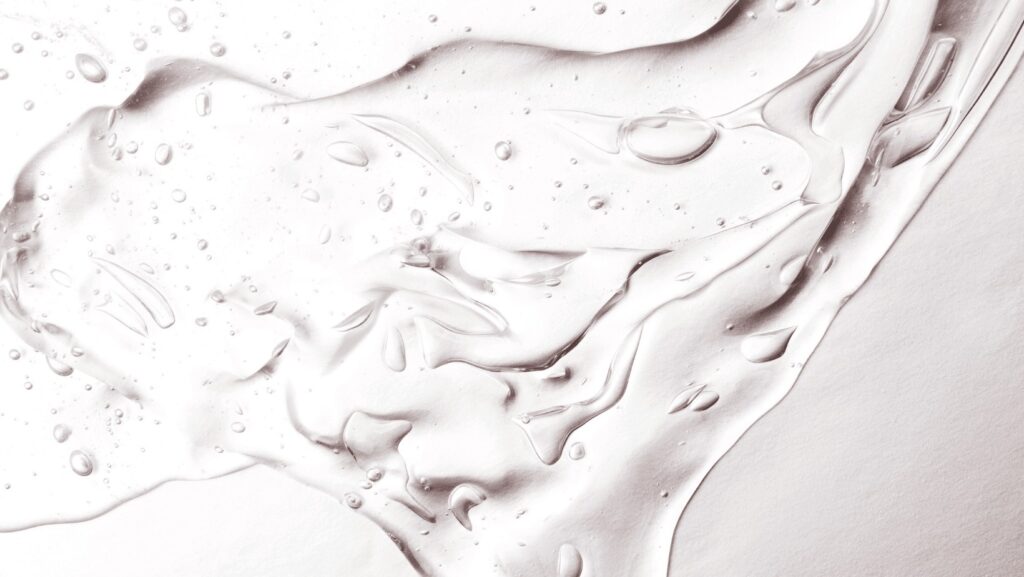
Potential Side Effects of Using Hyaluronic Acid
In the skincare world, hyaluronic acid products often include other vital ingredients. Two of the most common are lanolin and silicone-based ingredients.
Both of these are definitely worth being wary of if you have acne-prone skin because they tend to trap large amounts of dirt and bacteria inside your skin!
Clogged pores are the main contributor to acne, so avoid hyaluronic acid products containing lanolin or silicone-based ingredients.
Beyond these, there are also others you should watch out for, such as:
- Alcohol
- Parabens
- Sulfates
If you can, try to steer clear of any skincare or beauty product that contains any of the above ingredients– hyaluronic acid or not.
Another aspect of being aware of is the concentration of the hyaluronic acid you’re using, as applying a product with a high concentration of hyaluronic acid can lead to irritation in the skin.
The best course of action is to start with 1% concentration and slowly increase if your skin needs more.
How To Use Hyaluronic Acid For Acne
The first piece of advice is to start small!
It’s also essential to look for non-comedogenic products that won’t clog pores or break you out.
Hyaluronic acid is available in various forms (such as serums and moisturizers– just to name a couple), so it’s essential to do your research before rushing into anything.
Another vital thing to take into account is your skin type. Acne-prone skin can be combination, oily, or even dry. The products you integrate into your skincare routine must suit your skin type.
Always read the labels before buying, and double-check that a product won’t cause skin sensitivity or clogged pores. Avoid the ingredients I’ve listed above; start with 1% hyaluronic acid concentration, and you’re off to a good start!
When it comes to picking a hyaluronic acid product, I would recommend the Dermalogica Hyaluronic Ceramide Mist for all skin types (but best for drier skin).
La Roche-Posay’s Hyalu B5 Pure Hyaluronic Acid Face Serum is great for aging skin; The Ordinary Hyaluronic Acid 2% + B5 is another excellent choice to help reduce the appearance of fine lines and wrinkles.
All of these products are ideal for use on acne-prone skin and will help to nourish and hydrate at the same time as well.
Once you’ve chosen your hyaluronic acid product, apply it as advised. If this is your first time using hyaluronic acid, it’s important to ease it into your skincare routine!
Start using the product once or twice a week and slowly build up to daily use. Stay consistent in your routine, and your skin will eventually start thanking you for its extra dose of hydration.
The Bottom Line: Is Hyaluronic Acid Good For Acne?
Hyaluronic acid is an internet-famous ingredient for a reason. Its extraordinary hydrating and healing abilities make it a favorite amongst skin care lovers worldwide!
However, it’s not going to be everyone’s favorite product, and for those of you with acne-prone skin, you will likely receive differing results.
Hyaluronic acid is excellent for hydration (so long as you’re in a more humid climate), and it’s also great for healing your skin, protecting the barrier, and plumping the surface.
Although it won’t directly heal your acne or scars, it can significantly improve your overall skin health, hopefully leading to fewer future breakouts and scars!

